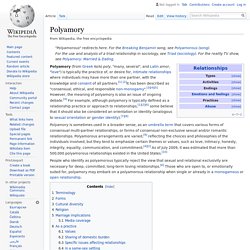

Alt.polyamory home page. The Truth about Polyamory. Information About Polyamory. Polyamory is the theory and practice of openly maintaining multiple sexual and/or romantic relationships.

Stef's Poly Post Archive I'm archiving and organizing some of my writings from alt.polyamory and the triples and poly mailing lists. I'm in the process of converting the material to HTML files organized by content. Polyamory. Polyamory (from Greek πολύ poly, "many, several", and Latin amor, "love") is typically the practice of, or desire for, intimate relationships where individuals may have more than one partner, with the knowledge and consent of all partners.[1] [2]It has been described as "consensual, ethical, and responsible non-monogamy".[3][4][5] However, the meaning of polyamory is also an issue of ongoing debate.[4] For example, although polyamory is typically defined as a relationship practice or approach to relationships,[1][2][6] some believe that it should also be considered an orientation or identity (analogous to sexual orientation or gender identity).[7][8] Polyamory is sometimes used in a broader sense, as an umbrella term that covers various forms of consensual multi-partner relationships, or forms of consensual non-exclusive sexual and/or romantic relationships.

Terminology[edit] No single definition of "polyamory" has universal acceptance. Poliamor. Entenda o poliamor, e as pessoas que se relacionam livremente. Polyamory May Be Good for You. On Valentine's Day, images of couples are everywhere.

They're buying each other diamond rings, making eyes over expensive restaurant meals and canoodling over chocolate-covered strawberries and champagne. But two-by-two isn't the only way to go through life. In fact, an estimated 4 to 5 percent of Americans are looking outside their relationship for love and sex — with their partner's full permission. These consensually nonmonogamous relationships, as they're called, don't conform to the cultural norm of a handholding couple in love for life. 5 Myths About Polyamory Debunked. By Stephanie Pappas, Live Science Contributor | February 14, 2013 10:11am ET Credit: William Perugini, Shutterstock Researchers estimate that as many as 5 percent of Americans are currently in relationships involving consensual nonmonogamy — that is, permission to go outside the couple looking for love or sex.

The boundaries in these relationships are remarkably varied, with some couples negotiating one-off "swinging" or partner-swapping experiences. and others forming stable bonds among three, four or five partners simultaneously. The latter is a version of polyamory, relationships in which people have multiple partnerships at once with the full knowledge of all involved. Polyamorous people have largely flown under the radar, but that's beginning to change as psychologists become intrigued by this unusual group.